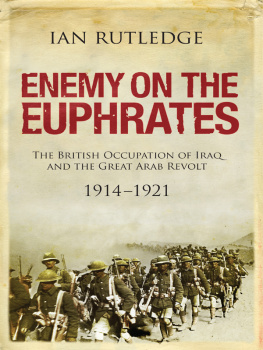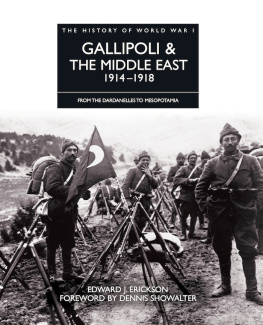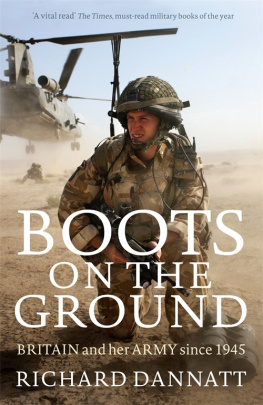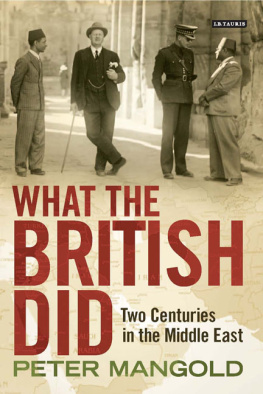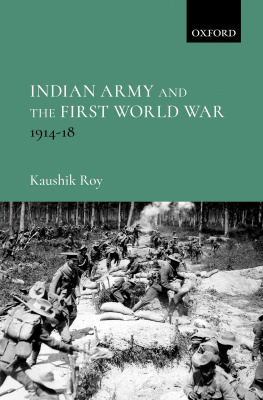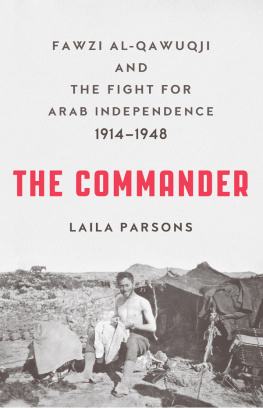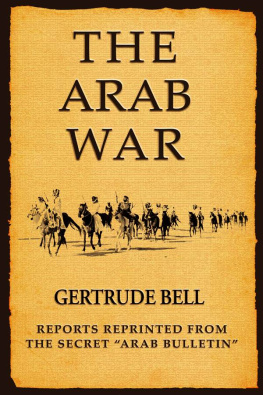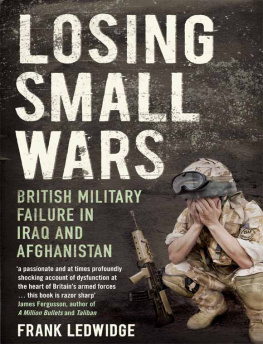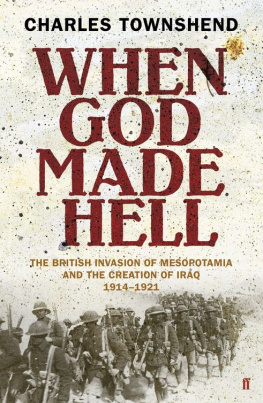ENEMY ON THE EUPHRATES
ENEMY
ON THE
EUPHRATES
The British Occupation of Iraq
and the Great Arab Revolt 19141921
Ian Rutledge
SAQI
Published 2014 by Saqi Books
Copyright Ian Rutledge 2014
ISBN 978 0 86356 762 9
eISBN 978 0 86356 767 4
Ian Rutledge has asserted his right under the Copyright, Designs and Patents Act, 1988, to be identified as the author of this work.
This book is sold subject to the condition that it shall not, by way of trade or otherwise, be lent, resold, hired out, or otherwise circulated without the publishers prior consent in any form of binding or cover other than that in which it is published and without a similar condition including this condition being imposed on the subsequent purchaser.
Every effort has been made to obtain necessary permission with reference to copyright material. The publishers apologise if inadvertently any sources remain unacknowledged and will be happy to correct this in any future editions.
First published 2014 in Great Britain by
Saqi Books
26 Westbourne Grove
London W2 5RH
www.saqibooks.co.uk
A full CIP record for this book is available from the British Library.
Printed and bound by Bookwell in Finland
For Diana, as always.
And for my beloved children,
Joanna, Daniel, Zoe and Emilie
What we want is some kind of modicum of Arab institutions which we can safely leave while pulling the strings ourselves, something which wont cost very much but in which our influence and political and economic interests will be secure.
Sir Arthur Hirtzel, February 1920
Whereas most westerners have no knowledge of the 1920 uprising, generations of Iraqi schoolchildren have grown up learning how nationalist heroes stood up against foreign armies and imperialism in towns like Falluja, Baquba and Najaf the Iraqi equivalents of Lexington and Concord.
Eugene Rogan, The Arabs: A History
Contents
List of Illustrations
List of Maps
Note on Arabic Transliteration
This has been kept as simple as possible. The symbol has been used for the letter ayn and for the glottal stop hamza. The feminine ending taa marbuta has simply been rendered as a final a (not ah or at). No subscript or superscript marks have been used. When an Arabic word or name which has entered the English lexicon appears, its customary English spelling has been retained (e.g. sheikh, not shaykh).
Glossary
| agha | Turkish title equivalent to Arabic sheikh. |
| al-Ahd | The Pledge. Secret organisation of Ottoman army officers opposed to Turkish domination, formed shortly before outbreak of the First World War. |
| al-Ahd al-Iraqi | Branch of al-Ahd formed after the end of the First World War and dedicated to some form of Independence in Iraq; generally more moderate than Haras al-Istiqlal and willing to seek accommodation with British interests. |
| ayalet | Name for a region of the Ottoman Empire. The system of ayalets was abolished in 1864 and replaced by a greater number of smaller vilayets. The term was resurrected in Mark Sykess proposals for the De Bunsen Committee in 1915. |
| bellum | Small, double-bowed, flat-bottomed Iraqi river vessel with a draught of less than eighteen inches, paddled, or powered by punt-pole; similar to but usually larger than the mashuf. |
| bey | Ottoman (Turkish) honorific title, in its military usage meaning a high-ranking officer, but subordinate to a pasha. |
| budoo | British Army slang for Bedouin. Generally, a term of abuse for all Iraqi tribal Arabs. |
| caliph | Successor to the leadership of the Islamic community. (See also Shii and Sunni.) |
| Dar al-Hujja | Conference hall of the Grand Mujtahid in Karbela. Literally, House of Religious Debate. |
| division (1) | Administrative region in British-occupied Iraq of which there were sixteen in 1920. |
| division (2) | Unit of the British Army usually comprising three brigades and commanded by a major general. |
| fatwa | In sharia law, a decision made by a qualified person e.g. a mujtahid; it may constitute a legal precedent. |
| faylaq | A corps in the Ottoman army. |
| Haras al-Istiqlal | The Independence Guards a nationalist organisation based in Baghdad. |
| havildar | Rank assigned to Indian soldiers in the British Imperial Indian Army, equivalent to sergeant. |
| Hejaz | The western part of the present-day state of Saudi Arabia, bordering the Red Sea. |
| heliograph | A means of military communication using a wireless solar telegraph that signals by flashes of sunlight (generally using Morse code) reflected by a mirror. |
| Istanbul | Capital of the Ottoman Empire on the European side of the Bosphorus. In 1920 the British still referred to it by its Christian name Constantinople. |
| Jamiyya al-Arabiyya al-Fatat | The Young Arab Society a secret organisation for the promotion of Arab interests within the Ottoman Empire, established before the First World War. Some of its members desired an independent Arab state. |
| Jamiyya al-Iraqiyya al-Arabiyya | A nationalist organisation based in the mid-Euphrates region which favoured an alliance with Mustafa Kemal and the Bolsheviks. |
| Jamiyya al-Nahda al-Islamiyya | The Islamic Renaissance Movement a small, secret organisation formed in Najaf in 1918, dedicated to the expulsion of the British from Iraq. |
| Jamiyya al-Takhlis al-Sharq al-Islami | Organisation for the Liberation of the Muslim East. Bolshevik Organisation set up under the aegis of the Eastern Department of Narkomindel (Peoples Commissariat for Foreign Affairs) whose function was to encourage the resistance of the Muslim peoples against European domination. |
| jemadar | Rank assigned to Indian soldiers in the British Imperial Indian Army, equivalent to second lieutenant. |
| jihad | A war or campaign in defence of Islam. |
| khan | Guest house for Muslim pilgrims or other travellers. |
| Khedivate | An autonomous tributary state of the Ottoman Empire. The British retained the name after they had effectively taken control of Egypt in 1882. |
| kufiyya | Typical headdress of tribal Arabs. |
| levies | British-officered Arab or Kurdish auxiliary troops. |
| madhbata | In this context, a set of demands or petition. |
| madrasa | An Islamic school, either religious or secular. |
| mahalla | A city quarter or district. Each of Najafs mahallas had its own headman and legal code. |
| mahayla | Iraqi river boat with lateen sail, between fifty and eighty feet in length and with a draught of between three and four feet; also known as a safina. |
| mandate | The right of control over a defeated enemy territory but with the assumption that the mandatory power will prepare it for eventual independence. In practice, a mandated territory was little more than a protectorate. |
| mashuf | Very small canoe-like Iraqi river vessel typical of the marsh lands, similar to but usually smaller than the bellum. |
| maulud | Celebration of the birth of the Prophet Muhammad. |
| memsahib | Respectable lady; term used by Indians to denote European wives. |
| mirza | Honorific title of Persian origin, literally prince but, more generally, sir. |

